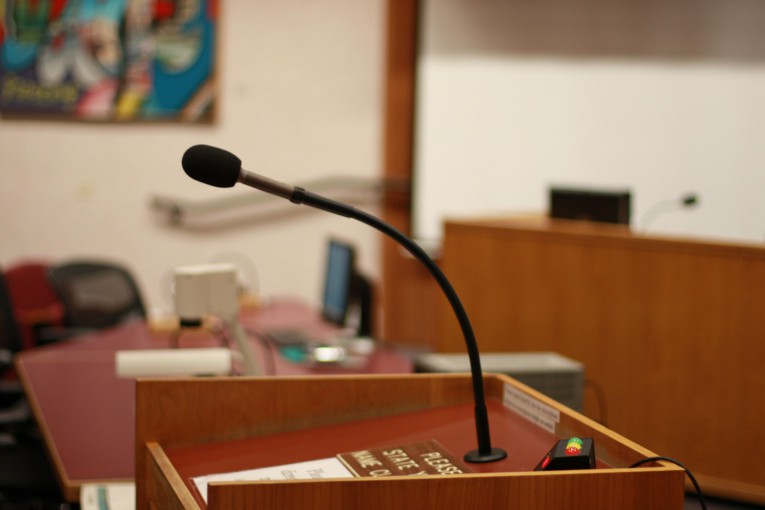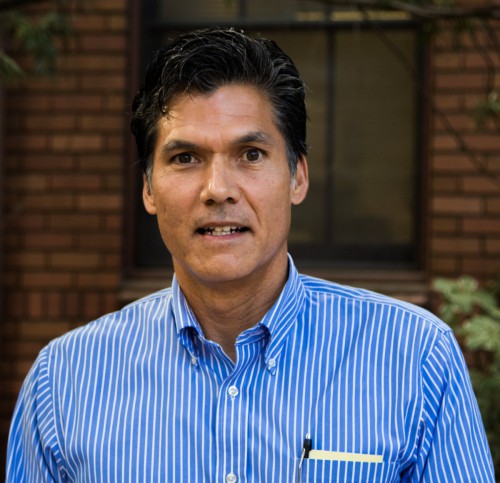

There is always a little consternation when a new mayor comes in and, having watched how the council rules work up close for the previous two years, has some ideas about changing things up.
Under current policy, individual public comments are limited to three minutes per individual “and 5 minutes for a person speaking on behalf of at least 5 people (who must stand at the dais with the speaker). The 5-minute policy has also been extended to individuals speaking on behalf of a recognized organization, such as Downtown Davis.”
Mayor Brett Lee writes in his submitted agenda: “The recommendation is to shorten this time period to 2.5 minutes – still ample time to share a message but a shortened period allowing for more people to speak during a public comment session. Members of the public are always able to provide written comments to the Council, via a handout or an email.”
The mayor has recommended setting a limit on the duration of overall general public comment.
He writes: “Every Council meeting must include a section for general public comment, for items not on the agenda or for individuals who cannot stay for an item on the agenda. The City Council has the ability to determine a reasonable length of time for the public comment period and to determine where on the agenda to place the public comment period.”
The mayor adds: “Davis has historically placed public comment early in the agenda, before regular items and the consent calendar. On occasion, the length of public comment has unexpectedly prevented the Council from addressing the agendized items on the regular and/or consent calendar. In order to better manage the meeting and ensure the Council is able to complete its agendized  items, the recommendation is to limit the general public comment period at the beginning of the meeting to no more than 45 minutes.
items, the recommendation is to limit the general public comment period at the beginning of the meeting to no more than 45 minutes.
“Anyone not able to comment during this time can speak at the end of the meeting in an additional public comment period, if needed. The same individual time parameters will apply. The intent is not to prevent individuals from speaking but to make sure that there is ample time to address items on the agenda.”
That would allow public comment period to officially go from 7:00 to 7:45. Under the proposed change, that would ostensibly limit the number of public comments to 18 using the maximum of 2.5 minutes. We would note that, even with three-minute comments, it is exceedingly rare that public comment goes past 8 pm.
The mayor is making additional changes as well.
There will be a new timer installed in the Chambers “so that members of the audience can clearly see the duration of public comments. This should make it easier for the speaker to manage his/her own time while addressing the Council.”
The mayor also discusses but rejects the idea of speaker cards. Mayor Lee writes: “The Council discussed on June 19 whether to implement speaker cards, as some public bodies have.”
One advantage to the speaker cards “is that the Council has a better idea how many people want to speak and can work to manage the time.”
On the downside, “speaker cards for general public comment and every regular item require a level of administrative coordination during the meeting that may be difficult to achieve. Some people feel that speaker cards make it easier for people unfamiliar with the process to speak; others feel that it complicates the process and is confusing for members of the public new to comment periods.”
The mayor concludes: “As there was no consensus on this during the previous Council meeting, there is no recommendation here to change the status quo, which does not require speaker cards.”
The mayor also addresses the times on the agenda and mid-meeting break. He notes that staff makes time estimates which assume that no part of the meeting is delayed. The result is that “the actual schedule is often out of sync with the published times on the agenda.
“Because it is difficult to predict exactly how long each item will take, a more reasonable approach to allowing for some flexibility is to build in a mid-meeting break,” writes Mayor Brett Lee. “If the Council is on or ahead of schedule, they can take the break. If the Council is behind schedule, they can shorten the break or delete it entirely.”
—David M. Greenwald reporting


I would like to see a prioritization for Davis Residents. Usually it would not be necessary. For particularly contentious issues I am much more interested in local residents opinions then the traveling circus.
I wonder about the legality of that. In general, there has not been much of a problem with out of towners. Also, would you include people from El Macero or UC Davis in that list?
No
As I said last time, I speak at Sacramento City Council meetings. I work there, spend money there, use the infrastructure. I’d be really pi**ed if I traveled there and wasn’t permitted to speak, or had to wait until 11pm to speak. So, bad idea. And WHAT traveling circus? Except on a couple of issues, it’s almost 100% Davis residents.
Alan I did say “Usually it would not be necessary” but on the picnic day issue and the Bacon Vandalism issue it does get crowded. if someone has to wait until 11 I would prefer it to an “activist” they generally have nothing useful to do anyway.
JH, I see your point — I never listened to all that testimony on those issues, but the Council had too and so did DG, so they are probably suffering from post-dramatic shock. Hard to regulate to weed out those bad nights. Maybe the 45 minute thing could be optional, so if only a few more people were present and it wasn’t a crowd of out-of-town activists, they’d have the option to continue on, and weigh that against staying on schedule.
The 2.5 minutes I’m OK with. I found 2 minutes too short on some issues, but usually 3 minutes can be compressed to 2.5.
I think the 45 minute cap will cause unintended problems. A person comes to the meeting — already a slog for most on a worknight — especially those with a job and family — and they can’t speak and have to stay for 2, 3, 4 hours — or come back at 10pm, 10:30pm, 11:00pm, 11:30pm, midnight? Who knows? So an hour away from home turns into 2-3 hours. Then if there’s a big contentious issue, the aggressive group will jockey to be in front so they can speak. Can you imagine someone to come speak about a personal issue they want dealt with, and the anti-police crowd take up all the spaces for the first 45-minutes for four months in a row?
That’s why I suggested on-line sign ups for those first (18, apparently) spaces. So you knew you were either in, or out, and didn’t have to waste your time. But then someone said it discriminated against those without computers or computer skills.
The other problem is the zombie factor. Speaking in front of a council at 11:30pm is like speaking in front of five zombies on information overload.
Groups speaking in front of Council on a non-agenda item is about being seen, not being heard and it has more to do with political theater than it does discourse. If you really want your concerns to be considered, put them in writing. If we didn’t have the regular ‘dog and pony shows,’ there would be no reason for this change to be considered.
As the owner of 17 dogs and four ponies, I resemble that remark.
Speaking expansively on the matter of long waits, monotony, repetition of issues, all that. Those responsible for this long time consumption are the same persons who argue for its continuance. The argument is this is representative democracy, a chance for the “common man” to fight City Hall. All that.
Everything comes at a cost. The cost in this instance is discouragement by many others who want to speak at council meetings, but are not willing to endure the 2-3 hour wait. On the other side of the podium, the people who have put toothpicks in their eyelids to give the appearance of staying awake and paying attention. Many qualified persons in the community would be willing to serve on local government forums if they did not have to endure the speakers’ marathon sessions which are routine events in this town. That’s a cost, a big cost.
I have been to City Council meetings in several towns dealing with different issues, and that’s the way it is. Attempts to make it better often make it worse.
Let’s get real here — there are other reasons for meetings and agenda items to drag on much longer than expected, and it is often long speeches from the dais for seed planting of media sound bites and political gain, not to better our City.
I’m not really attacking the Council about that, as again, that’s just how it is everywhere. More, I’m attacking the Council defenders and citizen-speaker trashers. Those who live in glass houses . . . . . have creepy people sitting in the bushes watching them.
The lengths of times spent explaining in detail what has already been fully covered in the written staff reports is one of the main culprits. Along with CC members asking staff questions about is generally clearly in front of them… clarifying questions should be forwarded to staff before the meeting… wish we could cutback on the lecturing/justifying by CC members individual we’re probably stuck with… more is the pity…
I hear there is some good TV on Tuesday night.